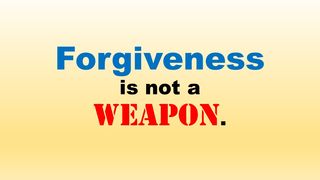Forgiveness
Weaponizing Forgiveness
Forgiveness can be misunderstood and dismissed for the wrong reasons.
Posted October 8, 2018
A colleague, Megan Feldman Bettencourt, has written an important article in Harper's Bazaar entitled "How Forgiveness Has Been Weaponized Against Women." The gist of the article is that as people misunderstand the actual meaning of forgiveness, they can so discourage people from forgiving that emotional healing is blocked. In the case of sexual abuse of women, as Ms. Feldman Bettencourt points out, the "forgiver" is supposed to refrain from reporting the abuse and is expected to go back into the unwanted relationship.

This is far from the truth because forgiveness is not the same as legal pardon (letting the other out of deserved justice), nor is it the same as reconciliation. Forgiveness is the commitment to get rid of resentment as well as the commitment, at the very least, of civility toward the offender and then acting on these commitments. Reconciliation is the act of two or more people coming together again in mutual trust. One can forgive and not trust or reconcile. When these two issues (legal pardon and reconciliation) are confused with forgiveness, then women who have been sexually abused do not have a scientifically-supported pathway (forgiveness) for reducing or even eliminating deep resentment. That kind of emotional disruption could be hers for the rest of her life. In other words, not only is she left with the original injustice but also is left with a second wound of resentment with little hope of relief from it because there are few alternatives to forgiveness in eliminating this inner poison.
In her article, Ms. Feldman Bettencourt gives stark examples of women who, in the name of forgiveness, think that they must keep the abuse against them secret, thus personally pardoning the offender. One woman who did stand up for justice (not condoning or pardoning) was shunned by her support group because that group misunderstood what forgiveness is. Forgiveness does not abandon the quest for justice. The author's call is for a clear and accurate definition of forgiveness so that it can exist side-by-side with justice-seeking and not block emotional healing. True forgiveness can enhance the forgiver's well-being.
Another Example of Weaponizing Forgiveness
I once was asked to help an organization set up small groups focused on forgiveness in the workplace because there was high tension among the workers. A Human Relations specialist in the company was convinced that adding a level of forgiveness into the workplace would be one strong way of diminishing the conflict and increasing productivity. When we met with the owner of that company, it took him less than five minutes to dismiss the specialist's idea. "No. Forgiveness is inappropriate here," he said with cold confidence. "Forgiveness asks too much of my workers," was his reply.

When we asked him how this is so, he quickly responded, "Look, when there is conflict in our workplace, this is an emotional pain. Forgiveness adds another layer of pain to my workers and so why would I impose this second pain on them? Forgiveness is quite a struggle and we don't need that at this time." And that was the end of the specialist's idea, which as of this writing has not been implemented... and the conflicts at that company continue with no end in sight. What the owner did not understand is this: When there is physical injury, sometimes surgery is needed. Yes, the surgery is an added burden, but it is temporary and restores what is broken. It is the same with forgiveness: When the heart is broken, we sometimes need surgery of the heart to restore emotional health.
Ms. Feldman Bettencourt sees how the weaponizing of forgiveness can actually hurt women who are trying to heal from sexual abuse. I have seen firsthand how the weaponizing of forgiveness can keep workers from reducing acrimony and striving toward greater cooperation.
The moral of this essay is that to misunderstand forgiveness is to keep people from a scientifically-supported way of reducing resentment and getting on with life in a healthier way. We misunderstand forgiveness sometimes at our own peril. We misunderstand forgiveness sometimes at the expense of others. It is time simply to define our terms — in this case forgiveness — and lay down the weaponizing against it.


